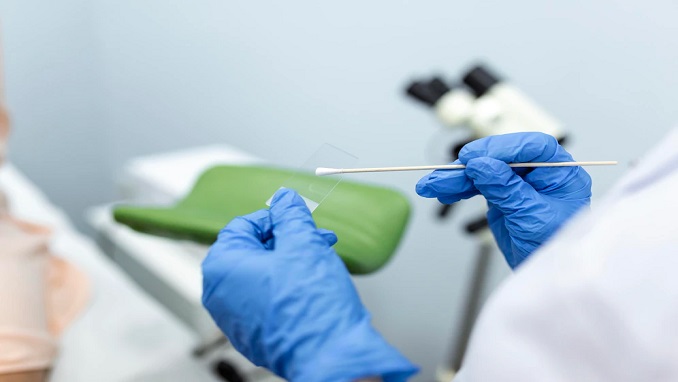Despite the advancement of prevention, detection, and early treatment options for many cervical cancers, late-stage cervical cancer diagnoses are up in the United States, with Black women more likely to be diagnosed with late-stage or metastatic cervical cancer, Good Day BIO reports, citing a recent study.
University of California Los Angeles Department of Obstetrics and Gynecology’s study published last week in the International Journal of Gynecologic Cancer shows that late-stage cervical cancer diagnoses are rising about 1.3% per year, and the rate of occurrence is growing among all women.
The study notes that with some 29,715 women diagnosed with late-stage cervical cancer from 2001-18, this type of cervical cancer is rare. However, it has “a five-year survival rate of only 17%.”
The overall prevalence of late-stage cervical cancer was higher in Black women with an incidence of 1.55 per 100,000 versus to 0.92 per 100,000 white women. Yet, “white women in the South aged 40–44 have the highest rise in distant cervical cancer at a rate of 4.5% annually.”
“One thing is that, you know, as with many health disparities, metastatic cervical cancer disproportionately affects minority populations, Black and Hispanic women. We’re actually seeing the largest rate of increase in advanced cervical cancer in non-Hispanic white patients,” said Dr. Alex Francoeur, one of the study authors, as quoted by CNN.
Using the Behavioral Risk Factor Surveillance System and TeenVax data, the study also established that “white women have a nearly two-fold higher rate of missed or lack of guideline screening, 26.6% vs 13.8%.”
White teenagers had lower rates of HPV vaccination (66.1% versus 75.3% for others).
Focus on prevention and early treatment of cervical cancer
According to the Centers for Disease Control and Prevention (CDC), “cervical cancer is the most common HPV-associated cancer among women.” This cancer is usually diagnosed “at younger ages than other HPV-associated cancers.”
The American Cancer Society emphasizes that early detection is critical, pointing out that HPV tests and pap smears can catch cervical cancer early. In addition, newly available treatments, including the new Tivdak, can improve greatly the prognosis.
Tivdak is the first and only approved antibody-drug conjugate used to treat recurrent cervical cancer, developed by BIO members Genmab and Seagen, Bio.News previously reported. Based on clinical trials, Tivdak has an objective response rate of 24%.
“Of this, 7% of patients achieved a complete response, while 17% of patients achieved a partial response. The median [duration of response] observed in patients was 8.3 months,” reports Clinical Trials Arena.
As Good Day BIO points out, “we have the tools to make cervical cancer a thing of the past thanks to biotech, we just need to use them.”

Vaccine hesitation increases cervical cancer cases
Considering the fact that since 2006, there’s an effective HPV vaccine – BIO member Merck’s Gardasil – cervical cancer should be rarer.
The UK, thanks to the rigorous vaccination campaign, has proved that by almost eliminating cervical cancer among women born after 1995.
As BIO previously wrote, it has also “reduced the likelihood of women ages 9-45 of contracting cervical cancer by as much as 87%.”
But in the U.S., the HPV vaccine is only required in 13 states. So, as Good Day BIO wrote late last year, “it’s estimated that there will be 14,480 new cases of cervical cancer in the U.S. this year and about 4,280 women will die from cervical cancer.”
According to the National Cancer Institute, “only 59% of 13- to 17-year-olds were fully vaccinated in 2020.”
Noting that “misinformation on social media was a major cause of skepticism,” Eric Adjei Boakye of Southern Illinois University, who recently shared his study of 16,383 adolescents who had not received the vaccine, emphasized that “parental skepticism regarding the HPV vaccine has been a known driver of suboptimal vaccine uptake in the U.S.”




